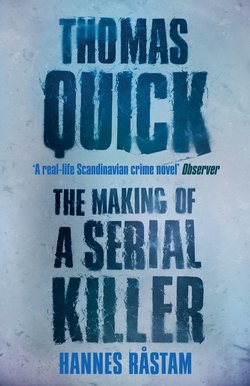Читать книгу Thomas Quick - Hannes Råstam - Страница 31
На сайте Литреса книга снята с продажи.
ОглавлениеTHE TURNING
‘I HAVEN’T COMMITTED any of the murders I’ve been convicted of and none of the murders I’ve confessed to either. That’s the way it is.’
Sture had tears in his eyes and his voice no longer carried. He looked at me, as if trying to work out whether or not I believed him.
All I knew was that he had lied. But was he lying to me now? Or when he confessed? Or on both occasions? I couldn’t be certain, but the prospects of finding out had just dramatically improved.
I asked Sture to try and explain right from the beginning, so I could understand better.
‘When I came to Säter in 1991 I had certain hopes that my time here would move things along for me, I’d gain insights into myself and learn to understand myself better,’ he began hesitantly.
His life was ruined and his self-esteem about as low as it could get. He was looking for a reason to exist, he wanted to be someone, and to belong.
‘I’d been passionate about psychotherapy for a while, especially psychoanalysis, and so I was hoping to improve my understanding of myself in that way,’ he explained.
A doctor on the ward named Kjell Persson, who was not a psychotherapist, had taken pity on him, but Sture soon realised that he wasn’t a very interesting patient. When Kjell Persson asked him to talk about his childhood he answered that he didn’t have any particular memories, he did not feel that anything was worth talking about.
‘I realised soon enough that the important thing was to start making up some memories from childhood, traumatic memories about dramatic events. And what a response I got as soon as I started talking about things like that. An incredible response!
‘More and more it was about sexual molestation and abuse and how I myself became an abuser. The story was built up in therapy and the things I said about it were helped along by benzo.’
Sture was already addicted to benzodiazepines when he got to Säter in April 1991 and gradually the range of drugs on offer and their dosages increased – mainly, he claimed, because of developments in the therapy room.
‘The more I told them, the more benzo I got. In the end I practically had free access to medicines, to narcotics.’
Sture maintained that in all the years of the murder investigations he was constantly drugged with benzodiazepines.
‘I wasn’t straight for a moment. Not one moment!’
Benzodiazepines are highly addictive and soon Sture could not live without the medicines. He ‘reactivated repressed memories’ in therapy, confessed to murder after murder and participated in a string of police investigations. In return he gained the attention of therapists, doctors, journalists, police and prosecutors. And he had unlimited access to narcotics.
I thought about all the people around Quick in the years of the police investigations – lawyers, prosecutors and police. Had they been aware that he was drugged? I asked.
‘They must have been! They knew I was taking my Xanax, and you could see by my behaviour that I was drugged. How could anyone not see that? It would have been impossible!’
The truth of this last comment was something I had been able to confirm for myself from the video footage taken in Norway. There was no mistaking that he was so heavily drugged at times that he was unable to walk or talk. And the medication was administered quite openly.
‘Was your use of medications ever discussed between you and your lawyer?’
‘No! Never.’
‘No one questioned your intake of medication?’
‘At no time! I never heard that question being asked.’
According to Sture, the doctors, therapists and carers had ensured that he had a constant and unlimited supply of narcotic medications.
‘Today it would be unthinkable, but at the time I was happy the question wasn’t brought up. It meant I could keep using those drugs.’
Sture claimed that he had been constantly drugged for almost ten years. It was during those years that he cooperated with the prosecutions, leading to his convictions for eight murders which he had not committed.
Then everything came to an abrupt end.
‘One day, it must have been towards the middle of 2001, there was a decision taken by the new chief physician at Säter, Göran Källberg. All the medications would be dispensed with. No more benzo. I was just terrified of having side effects from the withdrawal.’
I thought about what the retired chief physician Göran Källberg had said a few months earlier, about not wanting to be a part of a ‘cover-up of a miscarriage of justice’. I was starting to understand the general thrust of Källberg’s thoughts about Quick, the murders and his use of medications.
Sture had felt that there was a sort of silent agreement between him and Säter Hospital, a connection between his confessions for murder and the unlimited supply of medication. Now the terms of the agreement had been cancelled from one day to the next. His reaction was one of anger, bitterness and fear.
‘How was I going to live without medicine? What would it mean physically?’ Sture’s use of benzodiazepines had reached such high levels that it had to be reduced by gradual increments over an eight-month period.
‘They were difficult months. I just stayed in my room. The only thing I could do was listen to the radio, P1.’
Sture crossed his arms, clutching at each shoulder.
